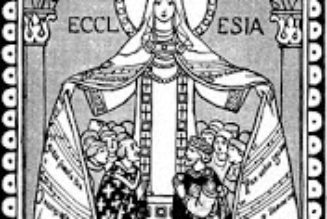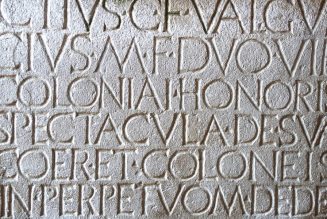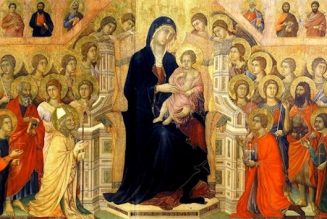
There is something rather too clever about how the Society of Jesus has handled the case of the now notorious Father Marko Rupnik. It’s Jesuitical actually, and not in the good sense.
Late last year, multiple allegations of sexual misconduct by Father Rupnik were reported in the Italian media. They mostly concerned sexual abuse of adult women who were part of Father Rupnik’s quasi-religious community and his artistic studio in Rome. Some of the abuse was allegedly part of the famous mosaic artist’s “creative” process.
When the extent of the allegations, over a period of many years, became evident, suspicions were raised that arguably the most famous Jesuit priest in the world — with prominent commissions in the apostolic place, Lourdes, Krakow and Washington — might have been given lenient treatment from the three most powerful Jesuits in the Church: Pope Francis, Cardinal Luis Ladaria, then prefect of the Congregation/Dicastery for the Doctrine of the Faith, and Father Arturo Sosa, superior general of the Jesuits.
It then became known that Father Rupnik had been convicted of a most grave crime, attempting to grant absolution of a partner in sexual sin, for which the penalty is automatic excommunication. When that penalty was confirmed by the CDF in May 2020, the excommunication was lifted in very short order. Father Rupnik was placed under some restrictions, namely not hearing confessions or giving spiritual direction to women. No public disclosure was made, in the name of transparency or to warn other potential victims.
In 2021, more allegations were made, and the CDF directed the Jesuit superior general to investigate. Father Sosa did so and in 2022, determined that there were sufficient grounds for yet another proceeding against Father Rupnik. It was not to be, though, as the DDF ruled that the statute of limitations precluded a canonical trial. When that ruling was made in the fall of 2022, it evidently produced sufficient indignation among some of those familiar with the case for them to leak the matter to the Italian media.
Since then the Jesuits have been in damage control mode, attempting to put as much distance as possible between the Society and the priest whom they formerly celebrated.
Earlier this year, a wave of new alleged victims came forward, and the Jesuits set out to investigate Father Rupnik for the third time in as many years. He was removed from ministry and forbidden to leave Rome.
By March, the Jesuits became convinced that the allegations were “highly credible” and asked Father Rupnik to begin a process of repentance and reparation. He evidently did not find that acceptable and, with the Jesuits freely denouncing him in the media, Father Rupnik was asked to leave the Society.
That request provided an accelerated opportunity to be rid of him, but it was a little too convenient. The Jesuits preferred to fire Father Rupnik, as it were, before he could quit.
Thus the Society expelled Father Rupnik in June, with the appeal period expiring this week. The grounds for expulsion were disobedience, though it must be noted that Father Rupnik was de facto his own superior for decades.
His expulsion ends the process, preventing a just penalty for his alleged canonical crimes. The Jesuits appeared content to say that Father Rupnik was not their problem anymore. Indeed, while they professed their disappointment that they could not have done more, the speed with which they blamed the Vatican’s “internal procedures” for lack of further prosecution suggested that relief for the Society rather than restitution for the crimes was their main goal.
Those claims were made in an explanatory letter from Father Johan Verschuren, the superior for the Jesuits’ international houses, where Rupnik formerly resided. In his letter, Father Verschuren wrote that those procedures “precluded an investigation that could have led to a harsher penalty.”
It’s an odd expression, because the relevant “procedures” are canon law.
The claim that canon law tied the Jesuits’ hands will be a blow upon a bruise for Father Rupnik’s victims, as Father Verschuren is telling them that the Church’s own law frustrates justice.
Thankfully, it is not true. This obvious attempt to pass the buck is easily explained. The Jesuits have chosen to flee from their own mess, leaving it to others to clean it up.
In 2009, Pope Benedict XVI, having dealt with complex cases himself as prefect of the CDF, introduced a new procedure whereby bishops and religious superiors could petition the Congregation for the Clergy to dismiss a priest for gravely scandalous behavior that, for one reason or another, could not be handled in other “procedures.” In his recent reform of the penal section of the Code of Canon Law, and in his new constitution for the Roman Curia, Pope Francis confirmed Benedict’s provision.
The Jesuits thus had an option to pursue justice for Father Rupnik’s victims and to punish him for his crimes. They chose not to do so.
The Jesuits apparently intend to answer all future questions about Father Rupnik by disavowing any further responsibility and blaming the Vatican. If so, they should be asked about the past.
In January 2020, the panel set up by Father Sosa unanimously judged that Father Rupnik had attempted the absolution of a partner in sexual sin. It would be May before the DDF would confirm that, but the penalty for that offence is an automatic excommunication. Even if no one else knows about it, a priest who does such a thing is already excommunicated. It does not require a canonical process.
In this case, Father Sosa knew in January 2020 that Father Rupnik was, in fact, excommunicated. At the very least he should have ordered Father Rupnik to cease from all ministry until such time as excommunication was lifted. He did not have to wait.
What Father Sosa actually did was to allow Father Rupnik to continue without hindrance, even though with every sacrament administered Father Rupnik was causing further offense, both canonically and to his own soul.
Most astonishingly, Father Sosa permitted Father Rupnik to preach to the Holy Father and the Roman Curia, filling in for one of the regular Lenten sermons. Before the Jesuits consign the Father Rupnik case to their archives, Father Sosa ought to be asked about that.
It may well explain why the Jesuits are so eager to claim now that they cannot do anything. It makes it easier to rationalize why they didn’t do what they should have done in the past. Jesuitical indeed.








